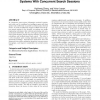Free Online Productivity Tools
i2Speak
i2Symbol
i2OCR
iTex2Img
iWeb2Print
iWeb2Shot
i2Type
iPdf2Split
iPdf2Merge
i2Bopomofo
i2Arabic
i2Style
i2Image
i2PDF
iLatex2Rtf
Sci2ools
127
click to vote
ATAL
2006
Springer
2006
Springer
Multi-agent based peer-to-peer information retrieval systems with concurrent search sessions
In cooperative peer-to-peer information retrieval systems, each node can be considered an intelligent agent and these agents work collectively to provide an information retrieval service. In order to effectively support multiple and concurrent search sessions in the network, we propose two traffic engineering techniques that minimize processing and communication bottlenecks. One is a novel agent control mechanism whose elements include resource selection, local search scheduling, and feedback-based load control. The other is a new two-phase query routing algorithm based on organizational knowledge. Experimental results show that this framework can reduce congestion situations, increase system throughput, and improve considerably the overall system utility. Categories and Subject Descriptors H.4 [Information Systems Applications]: Miscellaneous General Terms Algorithms Keywords peer-to-peer information retrieval, agents, control
ATAL 2006 | Information Retrieval Service | Information Retrieval Systems | Intelligent Agents | Peer-to-Peer Information Retrieval |
Related Content
| Added | 20 Aug 2010 |
| Updated | 20 Aug 2010 |
| Type | Conference |
| Year | 2006 |
| Where | ATAL |
| Authors | Haizheng Zhang, Victor R. Lesser |
Comments (0)

